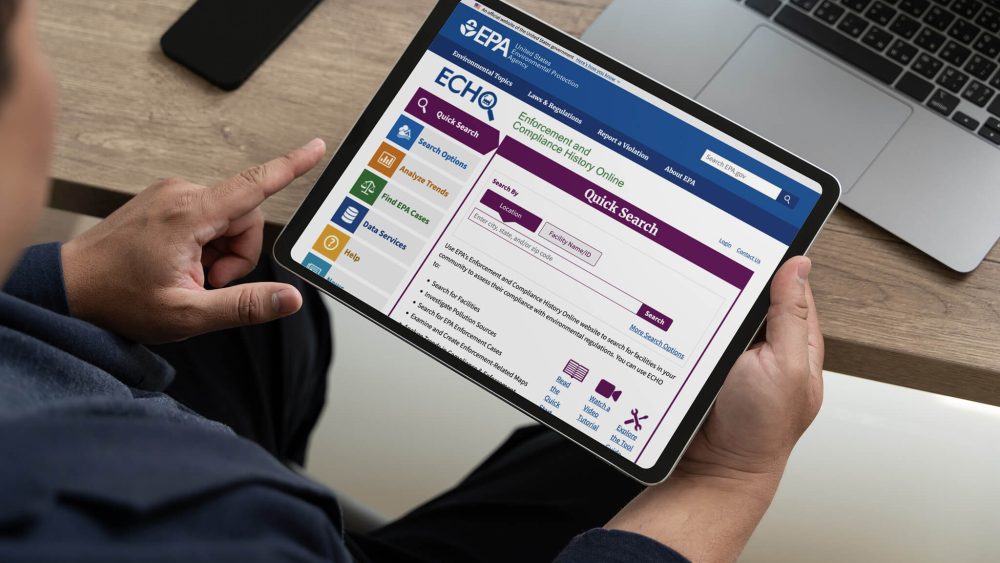Smart Mobile Tools for Field Inspectors (Smart Tools) supports inspection planning and management, field data collection, and evidence management, all within an integrated suite of digital tools to improve the quality, consistency, and timeliness of environmental inspections.
Paper-based environmental inspections are time-consuming and inefficient
Paper-based environmental inspections require hours of preparation and post-inspection work. Smart Tools bring environmental inspections into the 21st century by streamlining operations and improving the quality and consistency of information collected by inspectors.
The Smart Tools Project Team built upon existing technology to define and develop a suite of field inspection software tools
E-Enterprise supported the Smart Tools effort to expand on state agency efforts to develop inspection support software for a variety of media programs. States and the U.S. Environmental Protection Agency (EPA) started by holding a Lean process improvement event that addressed joint Resource Conservation and Recovery Act (RCRA), National Pollutant Discharge Elimination System (NPDES), and air requirements for a mobile inspection software solution. The team also tested ruggedized laptops for use with the Smart Tools software.
In 2018-2019, the Environmental Council of States (ECOS) and the Association of State and Territorial Solid Waste Management Officials helped the EPA customize Smart Tools for use in RCRA Subtitle C inspections. Smart Tools for RCRA was completed at the end of 2019 and rolled out for use by inspectors in the early adopter regions and the states of Arkansas and Maryland in 2020. Inspectors from 37 states have now attended training sessions, and several states have completed desk audits and field inspections using Smart Tools. The national rollout continues, and the user base is expanding rapidly. The EPA held a series of training sessions for RCRA and Underground Storage Tanks (UST) inspectors in 2023.
The Smart Tools project team, in partnership with ECOS and the Association of Clean Water Administrators, built upon Smart Tools for RCRA to define and develop a version for inspectors implementing the NPDES permit program for water pollution. The 2020 launch of Smart Tools for NPDES inspectors was followed by a series of training sessions in 2021 and 2022 to support further adoption as part of the national rollout.
Smart Tools was also launched for the UST program and the Good Laboratory Practices programs in Summer 2023.
What’s next for the Smart Tools project team?
The project team is evaluating Smart Tools for use in subprograms of the Clean Air Act and the lead-based paint program. The team continues to support current and new users from the RCRA and NPDES programs.
Adopting modern technology improves the operation and management of federal and state environmental inspection programs
The Smart Tools project has fundamentally improved the operation and management of federal and state environmental inspection programs by providing digital assistance to inspectors and their managers during each stage of the inspection process. The Smart Tools platform:
- Improves consistency and clarity of information
- Optimizes inspection resources
- Provides inspectors and their managers with a suite of digital tools to improve the quality, consistency, and timeliness of inspections
- Supports federal and state inspection planning and management, field data collection, and evidence management
- Prepares field inspectors to conduct and document their inspections both in the office and in the field on mobile digital devices
- Provides inspectors with full electronic access to relevant data, guidance, and reference materials, and
- Automates creation of draft inspection reports, pulling from inspectors’ electronic field notes and other evidence, including photos.
Key Contacts
Cornell Gayle
U.S. EPA Office of Compliance (Smart Tools RCRA)
gayle.cornell@epa.gov
202-564-0507
Morgan Everitt
U.S EPA Office of Compliance (Smart Tools SysAdmin for non-EPA users)
everitt.morgan@epa.gov
202-564-7374
Beth Graves
Environmental Council of the States
bgraves@ecos.org
202-266-4923
Sean Rolland
Association of Clean Water Administrators
srolland@acwa-us.org
202-455-9000
Kerry Callahan
Association of State and Territorial Solid Waste Management Officials
kerryc@astswmo.org





